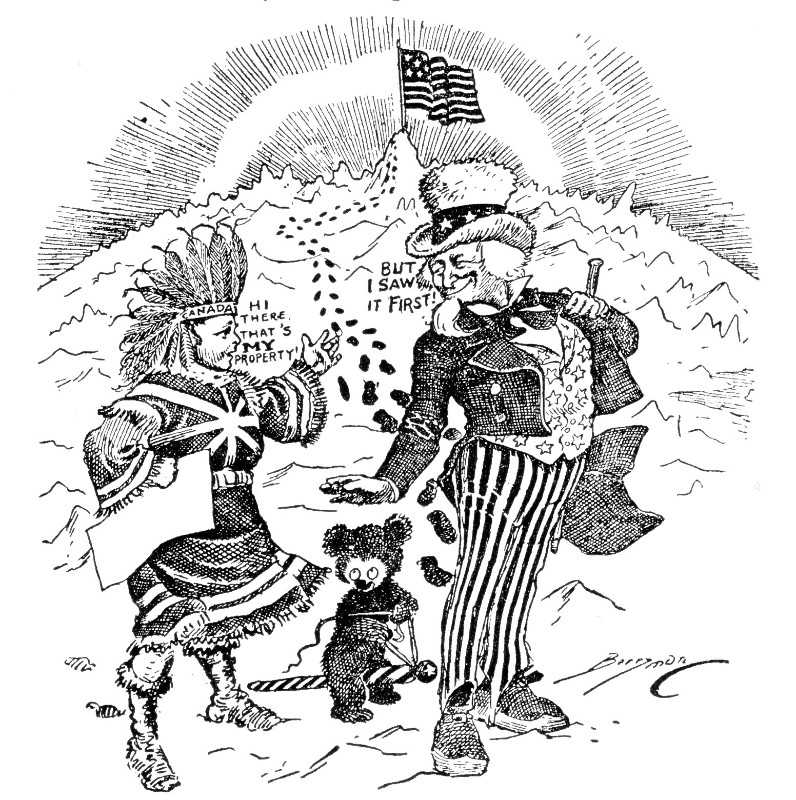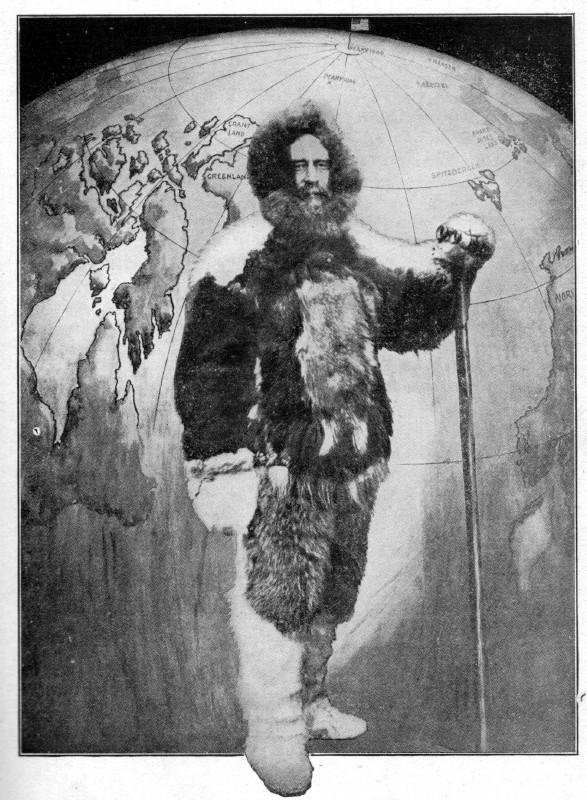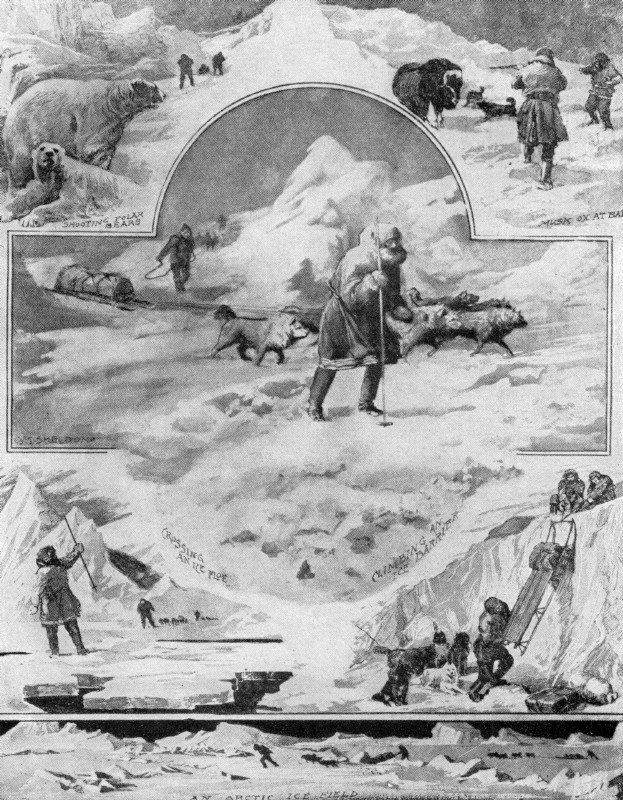| Web
and Book
design,
Copyright, Kellscraft Studio 1999-2011
(Return
to Web
Text-ures)
|
 (HOME)
|
| CHAPTER I.
THE NORTH POLE FOUND. "I have found the North Pole." From the deck of a Danish steamer as it touched at the Shetland Isles, Dr. Frederick A. Cook sent this message over the world September 1, 1909. It meant that an American explorer had reached at once the summit of his ambition and the summit of the world. It meant that a dozen other explorers saw their hopes blasted. It meant that a goal striven for since the sixteenth century, a lure that had caused human bones and the wreckage of ships to be strewn amid the ice of the desolate arctic, had been gained. More than a year had passed since Dr. Cook sailed from a point of communication with the civilized world. Not a word had come from the lone explorer who had plunged across the snows to possible doom. Then, on that first day of September, the captain of the steamer Hans Egede, a Danish craft, sent to the colonial office of his government this world-startling telegram: "We have on board the American traveler. Dr. Cook, who reached the North Pole April 21, 1908. Dr. Cook arrived at Upernavik (the northernmost Danish settlement in Greenland, on an island off the west coast) in May of 1909 from Cape York (in the northwest part of Greenland, on Baffin Bay). "The Eskimos of Cape York confirm Dr. Cook's story of his journey." That was all. Not a word to tell whether the explorer was well and sane, or whether, after his terrible journey northward and southward, he might not lie in his bunk, a raving maniac. But Dr. Cook's friends were speedily to be reassured. There was another message, this time to a friend in New York. It said: "Successful. Well. Address Copenhagen. (Signed) Fred." The friend, Mrs. Robert Pier Davidson, of 693 Bushwick Avenue, Brooklyn, was the intimate associate of Mrs. Cook, wife of the explorer. From Brooklyn the joyous news, not only of success, but of health, was forwarded with all speed to the explorer's wife, who was passing part of the summer in Maine. The two words, "successful" and "well," were all she needed to know. The one told her that her husband' had achieved what no man had achieved before. The other contained the (for her) even more heartening news that he had returned from the awful solitudes of the pole with health and strength. Before the day was over still another message reached the world. It was clearer and more conclusive than the others. It was addressed to the director of the observatory at Brussels, Belgium, M. Lecointe, an old friend and fellow-worker of Cook. It said: "I reached the North Pole on April 21, 1908. I discovered land far north. I return to Copenhagen by steamer." And so it had been done. A man had stood on "the top of the world" and had gazed upon expanses never before glimpsed by human eyes; perhaps, indeed, never seen by the eye of any living creature. More than kings and princes of the mythical world, more than navigators of the new world in the fifteenth century, has this tall, well built man who used to live at 670 Bushwick avenue, Brooklyn, N. Y., found a new thing under the sun. On that hour in April, 1908, that this man stopped his dog sledges, pulled out his sextant, and with mittened fingers fixed the instrument on the north star, shining out of the arctic night, he found himself — if the world will credit his statement — at latitude 90 and longitude anything he pleased. He found that by shifting the position of his feet on the tip of the world he could throw himself across a span of longitudinal lines that swiftest train and steamer could not cover in forty days. Perhaps in a whimsical moment this Brooklyn explorer balanced himself on the toe of one bearskin boot and whirled from right to left. Presto! he had added a day to his life. It took Dr. Cook months to work his way back from the region into which he had penetrated. It took only a few hours for his deed to become known in every city, every village, every spot on earth where civilized men hold communication with one another. And the world gasped and smiled, and cried out the questions: Who is Cook? How did he do it? What good is it? What does it mean to the world of the future? Thousands of men seized thousands of maps and searched for the spot whose attainment had caused all this uproar. They found ragged lines showing where continents had been traced by voyagers of former years; and then they found a blank — a blank indicating the spaces never penetrated. They found a circle, the imaginary line tracing the realm of the arctic, and other circles showing 80 degrees north latitude, and 85 degrees north latitude, and in the center of it all, that blank. Some now drew a dotted line from Greenland to the middle of this vacant spot, and they began to understand what Dr. Cook had done. What he did was to enter one of the few fastnesses of the earth, to explore one of the two spots thus far left unexplored, — one the North Pole, and the other the South Pole. lie had been to the axis of the globe, the center around which it whirls. He had been to a place where, says Sir Robert Ball, the noted English astronomer, "the sun rises and sets only once a year — six months daylight, six months night, mitigated only by a little twilight at the beginning and end of a period of awful gloom, broken by occasional moonlight or aurora. "The pole is truly a unique spot on the globe. Cook, standing there, faced due south, whichever way he looked. He was more than twenty miles nearer the center of the earth than if he stood at the equator. His weight was greater than anywhere else on the surface of the globe. A plumb-line in his hand pointed vertically upward to the pole of the heavens, around which all stars revolve. "Half of the stars he could never see; the other half never went below his horizon and would have been visible throughout the six months of night. The famous constellation Orion ever circled around and around this horizon. The pole star stood directly over his head." In summing up the meaning of what Dr. Cook did, Herbert L. Bridgman, secretary of the Peary Arctic club of New York, used these telling words: "The question naturally arises. What is the value of this achievement? Viewing the matter from viewpoints of the general public — as a great triumph of man over nature, as the achievement of a daring physical feat of the first magnitude — the news from Copenhagen makes Dr. Cook deservedly one of the great figures of the decade. He is the Columbus of the Arctic. What he has done no one can ever excel. There is no point further north — nothing left for any rival explorer to accomplish which can outdo his performance." Scientists the world over joined in the bedlam of discussion over the significance of the discovery. Dr. George Titmann, superintendent of the coast and geodetic survey at Washington, declared that the chief immediate value would be the actual geographical information obtained by Dr. Cook of the route over which he passed.  From the Washington Star Dr. Titmann also believed that the discovery will have great effect in stimulating elaborately equipped scientific expeditions for the collection of more technical data that will be of great value. As to the lay of the land, the set of the currents, the rise and fall of tides, the location of other islands or the expanse of water and its depth, Dr. Titmann concluded Dr. Cook must have secured valuable information. That it will be much easier in future to reach the pole there can be no doubt, in Dr. Titmann's opinion. Dr. Titmann suggested that if Dr. Cook had the proper equipment he might have taken pendulum experiments that would develop interesting additional data as to the figure of the earth. In general Dr. Titmann, while greeting the alleged discovery with delight as opening up a valuable field for scientific investigation, concluded that the discoveries made by Dr. Cook, or hereafter to be made by scientists following his lead, would be for the most part of further details about subjects already known in part. Dr. Titmann doubted, however, that any of these discoveries could have any great immediate practical importance. Navigation as a science will gain nothing, nor will meteorology. But in the verifying of what heretofore necessarily has remained in the status of theories Dr. Titmann said much will be gained. In the matter of pendulum experiments regarding the mass and figure of the earth he said all civilized nations are now making experiments, and experiments taken at the pole would add to their fund of information. Prof. William H. Brewer, of Yale University, said: "There are really no scientific theories as to what is immediately around the pole. There are some theorists who think there is an open sea and some who believe that a fertile spot is there. Scientific men are inclined to think that there may be little difference in immediate conditions close to the pole from those in the Arctic regions miles from there. "The discovery of the North Pole ranks as a great achievement. Before men began to climb mountains we didn't know much about mountains, but men have climbed mountains till there are few left unclimbed. Now when a man climbs a mountain for the first time it's a great achievement, but we have learned so much about mountains that his act may not aid much to the scientific knowledge about mountains. Just so with the scientific value of the discovery of the North Pole. "All reports from the Arctic seas indicate that last year was unusually severe, making it possible for Dr. Cook to proceed rapidly over the ice. Climbing over, the ice and icebergs toward the North Pole is like climbing through a city without streets. You have to climb over the houses. The fact that the year was so cold kept the ice floes together more compactly and added an element of rare good luck to his splendid courage."  THE MODERN COLUMBUS DISCOVERING THE NORTH POLE. From the Washington Star. The Matin, a great newspaper of Paris, had this to say: "The dawn of a new century has seen marvelous discoveries, not the least of which is that brought to us over the telegraph that the North Pole had been discovered and that an American explorer attained that point of the globe which is wrapped in mysterious legend and always has been deemed inaccessible. "For the last five centuries the efforts of explorers have tended toward the pole; for five centuries explorers have rushed to the Arctic extremity of the world. All peoples had tried to pierce the mystery of the polar ice and reach the exact spot where is the pole, and it is America which emerges triumphant in this heroic journey. "One thing is certain, a great feat has been accomplished and a marvelous victory has been won by the courage and tenacity of man over the savage brutality and relentless resistance of matter, and none will seek to stint to young America the enthusiasm which the glorious conquest merits; none will refuse her the tribute of admiration, well earned by one of her sons for the triumph which he has achieved for civilization." Discussion also arose over the value to the United States of the newly discovered lands. State department officials were of the opinion that it was of little consequence to the United States what lands Dr. Cook has discovered on his way to the North Pole so far as actual territorial possession is concerned. It was recalled by the department officials that ever since 1828 American explorers in both the Arctic and Antarctic have discovered vast areas of land to which no claims ever were made. Admiral Wilkes found in the Antarctic a territory of more than 100,000 square miles in area, and Dr. Kane made large discoveries in the Arctic, but no effort ever has been made by the United States to assert its right to them. Gen. Greely some years ago located lands which never before were known to exist. Many of the world's greatest navigators have from time to time made discoveries to which no claim ever was made. The principal reason for this, however, is said to be that these lands in every instance were almost inaccessible and absolutely of no value. The islands of Spitzbergen, which were discovered many years ago, still are without a recognized owner. On the maps these islands are designated as belonging to Russia, but her claim, if ever asserted, has never been recognized. These islands are not only accessible, but have developed some thriving industries, and only within the last few years has any effort been made to exercise over them any jurisdiction or authority. Recently, however, a conference was suggested of representatives of countries having interests in them to provide some sort of an administration for their government. The United States probably will be represented by reason of the fact that the only important coal mines in the territory are operated by Americans. As to the particular territory which Dr. Cook discovered the statement was made that it was quite probable that these lands would be found to be an extension of the mainland of Greenland, and, if so, they belong to Denmark. At any rate, it was held to be extremely improbable that the United States would attempt to assert sovereignty over them. But this was something for the future. It was enough, for the time, to know that Cook was an American. The United States could claim sovereignty over him.  COMMANDER PERRY, WHO HAS "NAILED THE STARS AND STRIPES TO THE POLE." The map shows positions reached by other Arctic Explorers.  DR. COOK'S EXPERIENCE ON HIS WAY TO THE NORTH POLE. HIS GREAT EFFORT GOING THERE AND HIS FIGHT FOR FOOD ON THE WAY BACK. |